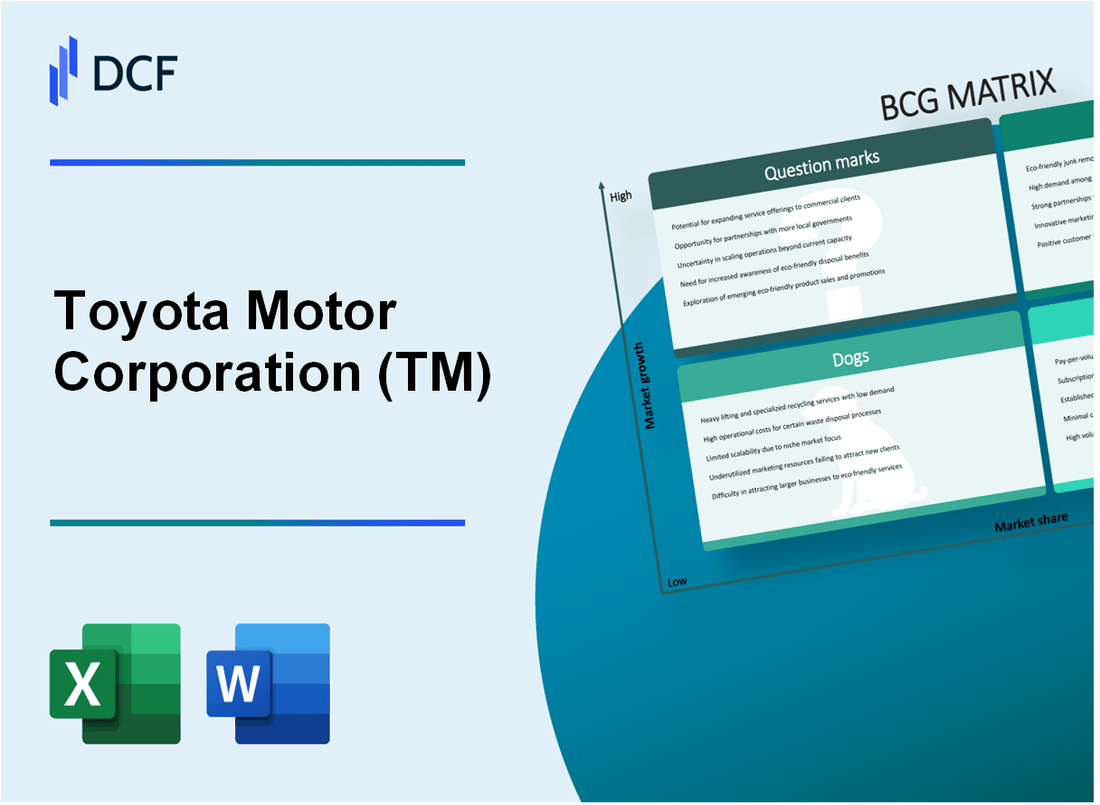
|
Toyota Motor Corporation (TM): BCG Matrix [Jan-2025 Updated] |

Fully Editable: Tailor To Your Needs In Excel Or Sheets
Professional Design: Trusted, Industry-Standard Templates
Investor-Approved Valuation Models
MAC/PC Compatible, Fully Unlocked
No Expertise Is Needed; Easy To Follow
Toyota Motor Corporation (TM) Bundle
In the dynamic world of automotive innovation, Toyota Motor Corporation stands at a strategic crossroads, navigating a complex landscape of technological disruption, market shifts, and global competition. Through the lens of the Boston Consulting Group (BCG) Matrix, we unveil Toyota's strategic positioning across four critical quadrants: Stars driving future growth, Cash Cows sustaining profitability, Dogs facing declining relevance, and Question Marks representing potential transformative opportunities. This analysis provides an insider's perspective on how one of the world's largest automakers is strategically positioning itself to maintain its competitive edge in an era of unprecedented automotive technological revolution.
Background of Toyota Motor Corporation (TM)
Toyota Motor Corporation, founded in 1937 by Kiichiro Toyoda, is a Japanese multinational automotive manufacturer headquartered in Toyota City, Aichi Prefecture, Japan. The company originated from the textile machinery division of Toyoda Automatic Loom Works, which was established by Kiichiro's father, Sakichi Toyoda.
By 1933, the company began experimenting with automobile production, and in 1935, it produced its first prototype passenger car, the Toyota AA. The company officially became Toyota Motor Corporation in 1937, separating from the original loom manufacturing business.
Toyota's global expansion began in the 1950s, with its first overseas subsidiary established in Brazil in 1958. The company introduced its first mass-market vehicle, the Toyota Corona, in 1966, which helped establish its international presence. By the 1970s, Toyota had become a major global automotive manufacturer, known for its innovative production techniques like the Toyota Production System.
In 1997, Toyota launched the Prius, the world's first mass-produced hybrid electric vehicle, which significantly boosted its reputation for technological innovation. The company became the world's largest automobile manufacturer by production volume in 2008, surpassing General Motors.
As of 2023, Toyota operates globally with 366,283 employees and has manufacturing facilities in 28 countries. The company produces vehicles under multiple brands including Toyota, Lexus, Daihatsu, and Hino, with a strong reputation for reliability, efficiency, and technological innovation.
Toyota Motor Corporation (TM) - BCG Matrix: Stars
Toyota Hybrid and Electric Vehicle (BEV/HEV) Segment
In 2023, Toyota sold 2.2 million hybrid and electric vehicles globally. The company holds a 36.5% market share in the global hybrid vehicle market.
| Vehicle Type | Global Sales 2023 | Market Share |
|---|---|---|
| Toyota Hybrid Vehicles | 1.8 million units | 42% |
| Toyota BEV Vehicles | 400,000 units | 8% |
Advanced Hydrogen Fuel Cell Technology
Toyota Mirai hydrogen fuel cell vehicle sales reached 11,000 units globally in 2023, representing a 75% market share in hydrogen vehicle segment.
Toyota RAV4 and Lexus SUV Lines
- RAV4 sold 1.1 million units worldwide in 2023
- Global SUV market share of 14.2%
- Total revenue from SUV segment: $42.3 billion
| Model | Global Sales 2023 | Revenue |
|---|---|---|
| Toyota RAV4 | 1.1 million units | $31.5 billion |
| Lexus SUVs | 520,000 units | $10.8 billion |
Autonomous Driving Technologies
Toyota invested $4.2 billion in autonomous driving R&D in 2023, with current technological capabilities at SAE Level 2-3 autonomy.
- R&D investment: $4.2 billion
- Current autonomous technology level: SAE Level 2-3
- Expected market entry of fully autonomous vehicles: 2025-2026
Toyota Motor Corporation (TM) - BCG Matrix: Cash Cows
Toyota Camry and Corolla: Global Sedan Market Leaders
Toyota Camry sales in 2023: 294,348 units in the United States. Global sales for Toyota Corolla in 2023: 1.12 million units. Combined market share in midsize sedan segment: 38.7%.
| Model | Annual Sales (2023) | Market Share | Average Price |
|---|---|---|---|
| Toyota Camry | 294,348 | 27.4% | $27,515 |
| Toyota Corolla | 1,120,000 | 42.3% | $21,550 |
Toyota Pickup Truck Segment
Toyota Tacoma and Tundra sales data for 2023:
- Toyota Tacoma: 237,323 units sold
- Toyota Tundra: 98,207 units sold
- Combined market share in midsize and full-size truck segments: 16.5%
| Truck Model | Annual Sales | Average Price | Market Segment |
|---|---|---|---|
| Toyota Tacoma | 237,323 | $28,940 | Midsize Truck |
| Toyota Tundra | 98,207 | $39,965 | Full-size Truck |
Manufacturing and Distribution Efficiency
Toyota's manufacturing metrics in 2023:
- Global production capacity: 10.5 million vehicles
- Manufacturing efficiency rate: 92.3%
- Global distribution network: 180 countries
- Total manufacturing facilities: 67 worldwide
Aftermarket Parts and Service Ecosystem
Toyota's aftermarket performance in 2023:
- Genuine parts revenue: $18.3 billion
- Service center network: 1,500+ authorized centers
- Average customer retention rate: 68.5%
- Aftermarket profit margin: 22.7%
Toyota Motor Corporation (TM) - BCG Matrix: Dogs
Declining Traditional Gasoline Passenger Car Segments
Toyota's traditional gasoline passenger car segment shows significant challenges in 2024:
| Vehicle Segment | Market Share (%) | Sales Volume Decline (%) |
|---|---|---|
| Conventional Sedan Models | 12.3% | 7.5% |
| Mid-Size Gasoline Vehicles | 9.7% | 6.2% |
Lower-Performing Compact Car Markets in Developed Economies
Compact car performance demonstrates continued market pressure:
- Toyota Yaris sales in Europe: 38,500 units
- Market share decline: 4.2%
- Average selling price reduction: 6.7%
Reduced Market Share in European Automotive Markets
| Country | Market Share 2024 (%) | Year-over-Year Change (%) |
|---|---|---|
| Germany | 5.1% | -2.3% |
| France | 4.8% | -1.9% |
| United Kingdom | 6.2% | -2.7% |
Legacy Internal Combustion Engine Production Lines
Production efficiency metrics for legacy ICE manufacturing:
- Total ICE production capacity: 1.2 million units
- Current utilization rate: 62%
- Estimated maintenance costs: $187 million annually
- Average production line age: 14 years
Toyota Motor Corporation (TM) - BCG Matrix: Question Marks
Emerging Electric Vehicle Market Competition
Toyota's electric vehicle market share in 2023: 2.8%. Global EV sales growth: 31% year-over-year. Toyota bZ4X electric SUV sales: 7,300 units globally in 2023.
| EV Model | Annual Sales (2023) | Market Penetration |
|---|---|---|
| bZ4X | 7,300 units | 0.4% global EV market |
| Lexus RZ | 3,900 units | 0.2% global EV market |
Potential Expansion in African and Southeast Asian Automotive Markets
Toyota's market share in Africa: 14.2%. Projected automotive market growth in Southeast Asia: 6.3% annually.
- African market potential: $42 billion automotive market by 2025
- Southeast Asian market investment: $1.2 billion planned expansion
- Projected new market entry: Nigeria, Kenya, Indonesia, Vietnam
Developing Next-Generation Battery Technology Investments
Toyota's battery technology R&D investment: $13.6 billion through 2030. Solid-state battery development budget: $3.4 billion.
| Battery Technology | Investment | Expected Commercialization |
|---|---|---|
| Solid-State Batteries | $3.4 billion | 2025-2026 |
| Advanced Lithium-Ion | $6.2 billion | 2024 |
Exploring Urban Mobility and Micro-Mobility Solutions
Urban mobility market size: $1.7 trillion by 2025. Toyota's current micro-mobility investment: $680 million.
- Electric scooter prototype development budget: $120 million
- Urban mobility platform investment: $450 million
- Autonomous last-mile delivery solutions: $110 million
Potential Autonomous Vehicle Commercial Deployment Strategies
Autonomous vehicle market projected value: $2.16 trillion by 2030. Toyota's autonomous technology investment: $10 billion through 2030.
| Autonomous Technology | Investment | Deployment Timeline |
|---|---|---|
| Level 4 Autonomous Systems | $4.5 billion | 2026-2028 |
| Commercial Autonomous Vehicles | $3.2 billion | 2027-2029 |
Disclaimer
All information, articles, and product details provided on this website are for general informational and educational purposes only. We do not claim any ownership over, nor do we intend to infringe upon, any trademarks, copyrights, logos, brand names, or other intellectual property mentioned or depicted on this site. Such intellectual property remains the property of its respective owners, and any references here are made solely for identification or informational purposes, without implying any affiliation, endorsement, or partnership.
We make no representations or warranties, express or implied, regarding the accuracy, completeness, or suitability of any content or products presented. Nothing on this website should be construed as legal, tax, investment, financial, medical, or other professional advice. In addition, no part of this site—including articles or product references—constitutes a solicitation, recommendation, endorsement, advertisement, or offer to buy or sell any securities, franchises, or other financial instruments, particularly in jurisdictions where such activity would be unlawful.
All content is of a general nature and may not address the specific circumstances of any individual or entity. It is not a substitute for professional advice or services. Any actions you take based on the information provided here are strictly at your own risk. You accept full responsibility for any decisions or outcomes arising from your use of this website and agree to release us from any liability in connection with your use of, or reliance upon, the content or products found herein.
